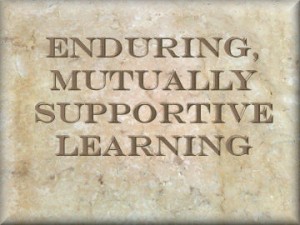 I am approaching the end of my 30th year as an educator. Let us assume that a school year is composed of 200 teaching days. Granted, those in the profession know that does not reflect the reality, as a teacher’s school year always starts well before the first day of classes and includes significant commitment outside of the regular school calendar. However, for the sake of keeping the Math simple, let’s consider it in this way: 200 school days per year x 30 years = 6000 days.
I am approaching the end of my 30th year as an educator. Let us assume that a school year is composed of 200 teaching days. Granted, those in the profession know that does not reflect the reality, as a teacher’s school year always starts well before the first day of classes and includes significant commitment outside of the regular school calendar. However, for the sake of keeping the Math simple, let’s consider it in this way: 200 school days per year x 30 years = 6000 days.
My 6000th day is on the horizon, and it will be my last.
It all comes down to this:
A reflection on such a journey could focus on changes that have occurred over time or enumerate the host of lessons learned. But memory lane is a meandering path and there is little to be gained from traveling that road for very long.
I have of course given great consideration as to “what comes next”. There is no reason to expect that the characteristics by which one was defined during the course of one’s career will suddenly change when that career comes to an end. That indicates to me that life after day 6000 is likely to largely resemble life before day 6000. I will remain an enthusiastic learner and continue to seize opportunities to build capacity in those around me.
And as I leave it is my hope that at least to some extent, those characteristics will have imprinted on others so that what remains is an enduring and mutually supportive learning community.
Therefore, it is with a high degree of confidence that I can honestly say that 6000 days have taught me that public education really does boil down to those simple words: enduring, mutually supportive learning.
What matters, and what doesn’t:

Shifting demands placed upon our public institutions have the potential to cause strain to the breaking point. The above phrase can serve as an effective filter when faced with the flood of initiatives, programs and processes that attempt to find their way into schools. That which stands up to scrutiny is worthy of inclusion in public education. That which fails to pass the test must not impose upon the critically important work we do.
The key word of course is “learning”. What else should schools possibly be about? Under no circumstances should that be limited to teachers teaching students. Terms such as “learning community” imply that we are all learning from each other. Certainly, teachers facilitate the learning of their students, but example is the best precept; every individual concerned with public education must be grounded in a mindset that continually prompts consideration of the question: What will I learn today?
It is imperative that no one person, group, or ideal exerts so much influence that direction is lost in their absence. Public education must continually move forward, building on individual contributions and enthusiastically embracing new opportunities.
To that end, I hope I have contributed to creating the architecture within which people are inspired to embrace and share learning and that I have somehow impacted upon the interia that will keep it all moving forward.
If that is all that I have been able to accomplish, I consider my 6000 days well spent.